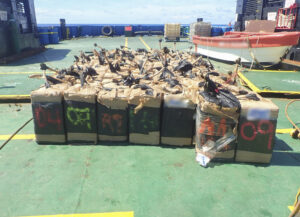While negotiations with the Trump administration continue, the European Commission is now preparing a new response if it fails to convince the US president to curb tariffs on European goods.
The European Commission has formally launched a public consultation on a list of US imports which could become subject to EU countermeasures.
The consulted list covers imports from the US worth €95bn, covering a wide range of industrial and agricultural products. The Commission is also consulting on possible restrictions on certain EU exports of steel scrap and chemical products to the US worth €4.4bn. This consultation is designed to look at both US universal tariffs and tariffs on cars and car parts.
“Tariffs are already having a negative impact on the global economies. The EU remains fully committed to finding negotiated outcomes with the US,” said Commission President Ursula von der Leyen in a statement. “At the same time, we continue preparing for all possibilities, and the consultation launched today will help guide us in this necessary work.”
The EU said it has “prioritised finding a mutually beneficial and balanced solution through negotiations, including within the framework of the 90-day partial suspension of tariffs announced by the US. These negotiations are ongoing both at political and technical level.”
The EU is also set to launch a WTO dispute against the US on its universal so-called “reciprocal” tariffs and tariffs on cars and car parts, by formally lodging a request for consultations.
The EU is of the view that these tariffs “blatantly violate fundamental WTO rules.”
The EU’s aim is therefore to reaffirm that internationally agreed rules matter and cannot be unilaterally ignored by any WTO member, including the US.
In addition, the Commission will continue to negotiate with other trading partners to find new export outlets and diversify its sources of supply.
The consultation process will remain open until 10 June.
On the basis of the information gathered, the Commission will finalise its proposal for the adoption of countermeasures and consult Member States. “Once this process is completed, the Commission aims to have the legal act imposing the countermeasures ready to use in case negotiations with the US do not produce a satisfactory result,” the European Commission said.
Meanwhile, once the EU formally submits its request for WTO consultations soon, the two parties will have up to two months to find a mutually agreed solution. If the consultations fail, the EU will be able to request the establishment of a panel to assess the merits of the case.



